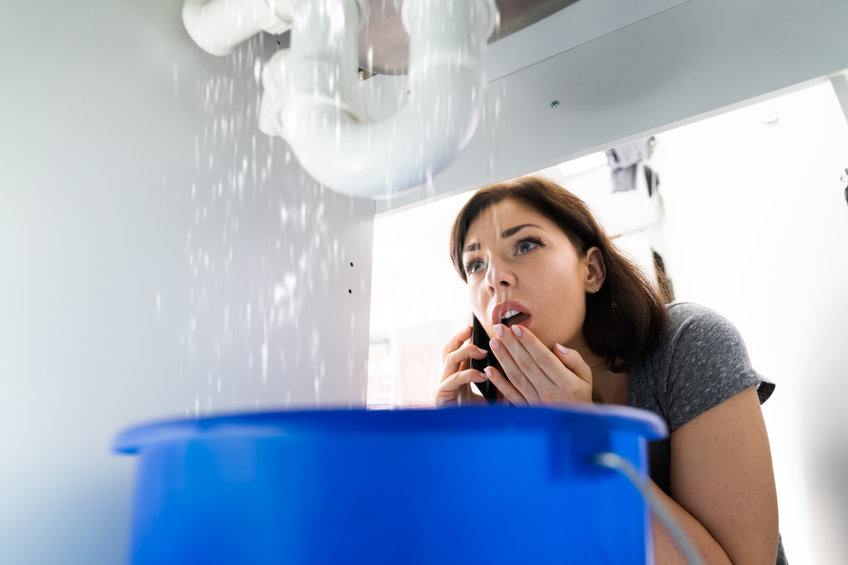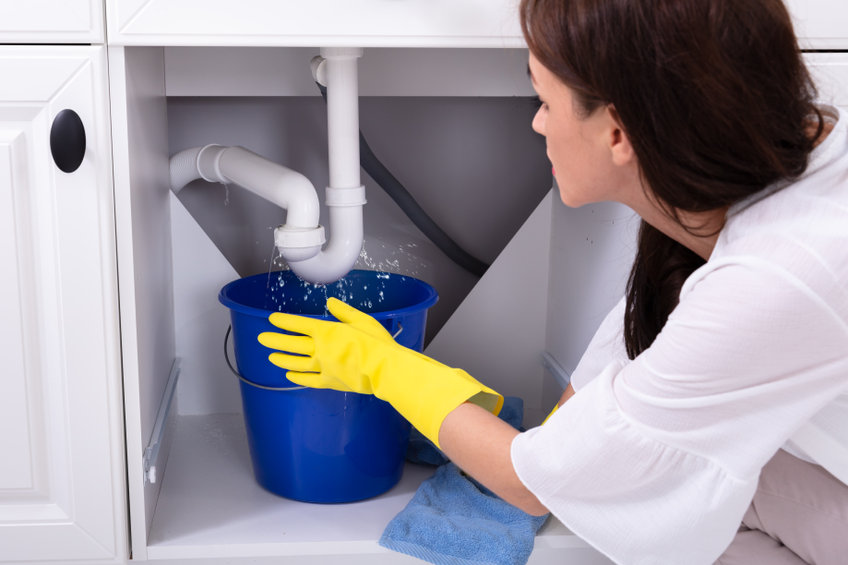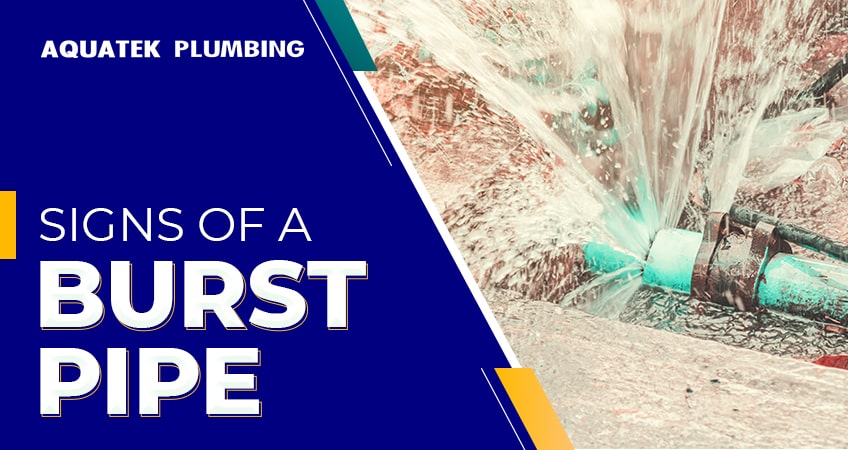A burst pipe is something that we pray doesn’t happen to us. It’s never a good situation to be in because an “escape of water” is going to cause a lot of damage to your house. And while you’re taking care of the cleanup, you may wonder if you missed some key signs. Let’s show you what you need to look out for so you can prepare yourself but also minimise the damage.
7 Signs of a burst pipe
Not all water pipes will flood the house quickly. There will be leaks that cause widespread damage to the property over a long period of time. This is why you need to be aware of the following symptoms of a slow leak:
1. The water doesn’t look right
Over time, a burst pipe will begin to rust. If your water has a slight brownish tint, this could be due to rust and needs addressing as soon as possible because of the potential for bacteria.
2. Fluctuating water pressure
If you experience a burst pipe, there will be extreme pressure changes which can have a big effect on the plumbing system and can cause damage to the fittings of the pipe.
3. Puddles under the sink
If you keep seeing puddles under the sink, you will need to inspect the wall about the pipe cover plates and check for any damp spots.
4. You can smell rotten eggs
Even a slight odour of rotten egg is a sign that there could be leaking sewage. The smell of rotten eggs is actually hydrogen sulphide, a naturally occurring gas in sewer lines.
5. The pipes are making noises
Because of the water pressure fluctuating, this will create movement in the plumbing system. As the pipes begin to bang and run at the tension points, this will cause various noises behind the walls which can result in additional breakage.
6. You can hear running water
If you notice sounds inside the walls like hissing or gurgling, it’s very likely the sound of the water reacting to the temperature fluctuations.
7. Water stains on the ceiling
When a pipe bursts, the water will leak down through the ceiling, creating visible water stains, as well as cracking the paint.
What do you do if a water pipe breaks?


The first thing you need to do before you clean up a water leak is to stop the flow of water. Locating the source of a burst pipe can be tricky, so you need to turn off the main water supply with the stopcock. You also need to drain the water and pressure from the system by turning on all the cold taps and flushing the toilets. There are also some additional tips that can help:
- If the burst pipes are behind the kitchen wall, you need to dry out any adjacent cabinets and drawers after finishing the repairs.
- If you need to thaw out any frozen pipes, you need to be careful and take every care to protect the property and yourself. When you’re dealing with frozen pipes or a break in the pipe during summer, make sure you switch off the electricity at the mains before beginning any repairs.
- Keep a lot of documentation! While you may not be thinking about claiming on your insurance right away, you’ve got to take detailed documentation of the property. Taking pictures will help make the process easier when you are ready to file a claim.
How do you fix a burst pipe?
A burst pipe can cause a lot of damage. After turning off the water supply and draining the system, you need to do the following:
- Switch off the central heating. If the central heating uses any fuel, you need to let this die out. Once the water heating has shut down, you can turn on the hot tap switch to help drain the system.
- Switch off any electricity. If there’s any water from the pipe leaking near the electrics or electrical appliances switch off the mains as a priority. However, if the main switch is wet, do not touch it as you could risk getting electrocuted.
- Exercise care and caution. If you notice any leaks quickly enough, for example, if it’s dripping through the ceiling, you can catch this water in buckets. But if the leak has been in an isolated spot for some time, for example, a spare room you rarely use, and the ceilings are bulging, the room may not be safe to enter. If the ceiling is bulging and you are confident that it’s not causing any danger, you can pierce a small hole with a screwdriver to let the water drain.
If you don’t know how to fix a burst pipe by yourself, it’s important to call a professional plumber. Many people feel they are experts in DIY, in which case, they will try to fix the issue by themselves. However, it’s important to note that if the burst pipe is leaking from a screw fitting you can try to tighten it yourself to limit the damage, but if the pipe is pierced with a nail or split, this will require additional repairs.
How long does it take to fix a burst water pipe?


The answer to this question can vary, as there is no one-size-fits-all practice. The length of the time to repair a burst pipe can depend on a number of factors:
- The extent of the pipe’s corrosion.
- If the pipe is collapsed or not.
- If there are pests in the property, including rodents.
- If a tree root has punched through an external pipe.
When professional help is called to fix a pipe, they can usually solve the issue within a matter of hours.
Does building insurance cover burst pipes?
As a general rule, insurance does cover water damage, and the repair or replacement of damaged pipes is usually covered under building insurance policies. Commonly referred to as “escape of water” or “water damage,” both terms mean damage caused by a water source in the home, such as a burst pipe.
As it is one of the most common types of claims, the cover can vary in addition to your standard home insurance excess. However, it’s important to note that the insurance company may not pay out if the pipes are not properly insulated, also known as “lagged.”
How much does it cost to fix a burst water pipe?
There are a few factors at play. The repair of a leaking pipe is calculated to be, on average, £235 per job. However, there can be additional costs based on how easy to access the pipe is. If, for example, the pipe is underground, additional measures will need to be taken to gain access to the pipe and restore the area after the repair has been made.
The majority of underground pipes belong to the water board, making it their responsibility to cover the cost of repairs. If the main water pipe is leaking and it is in your home, it is your responsibility. The cost can also vary depending on the level of repair and the extent of the damage.
If, for example, any sections of the pipe need replacing rather than repairing, this can add to the overall cost. The best way to calculate the cost is to take into account the following:
- The location of the pipe.
- The type of damage the pipe has suffered.
- The contractor.
- Any additional fees based on the contractor of choice.
A burst pipe is not a fun situation. It is one of the most common causes of damage within the home. When we are experiencing a burst water pipe, it’s not just the fact that we’ve got to locate the source of the problem and pay to fix it, but we’ve also got to go through the rigmarole of claiming on the insurance policy if it has caused extensive damage to our personal possessions.
While it’s not a great situation, the best solution is to always be prepared.
Dealing with a burst water pipe means being skilled in detecting leaks, but also understanding that you can prevent your pipes from bursting with a few simple things:
- Being aware of the fluctuating temperatures, winter temperatures can cause your pipes to freeze, meaning they could burst.
- Insulating your loft.
- Insulating your water supply pipes.
- Turn off the supply pipe if you leave the property for a few days.
- Being on top of plumbing maintenance issues.
Contact Aquatek Today


A burst pipe can be a major problem that can cause a lot of headaches and stress, but if you are looking for comprehensive support in preventing, detecting, and fixing a burst pipe, you can contact Aquatek. We offer a wide range of services to ensure that, if you experience a burst pipe, you can minimise the damage and stress. With some of the best maintenance support around, we promise we can help you deal with a burst pipe. Get in contact with us today to see how we can help you.



